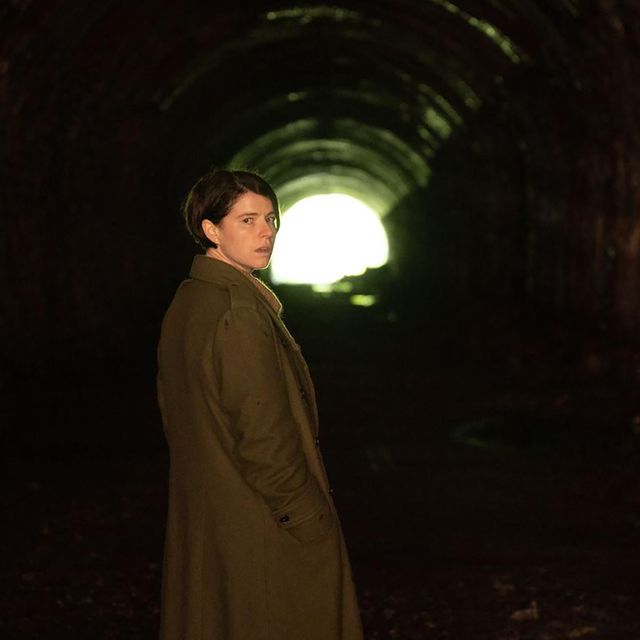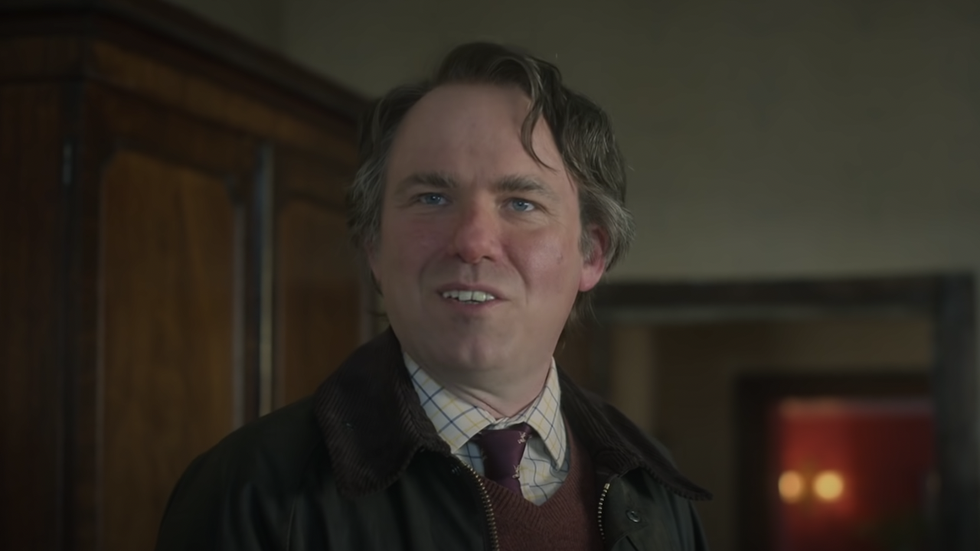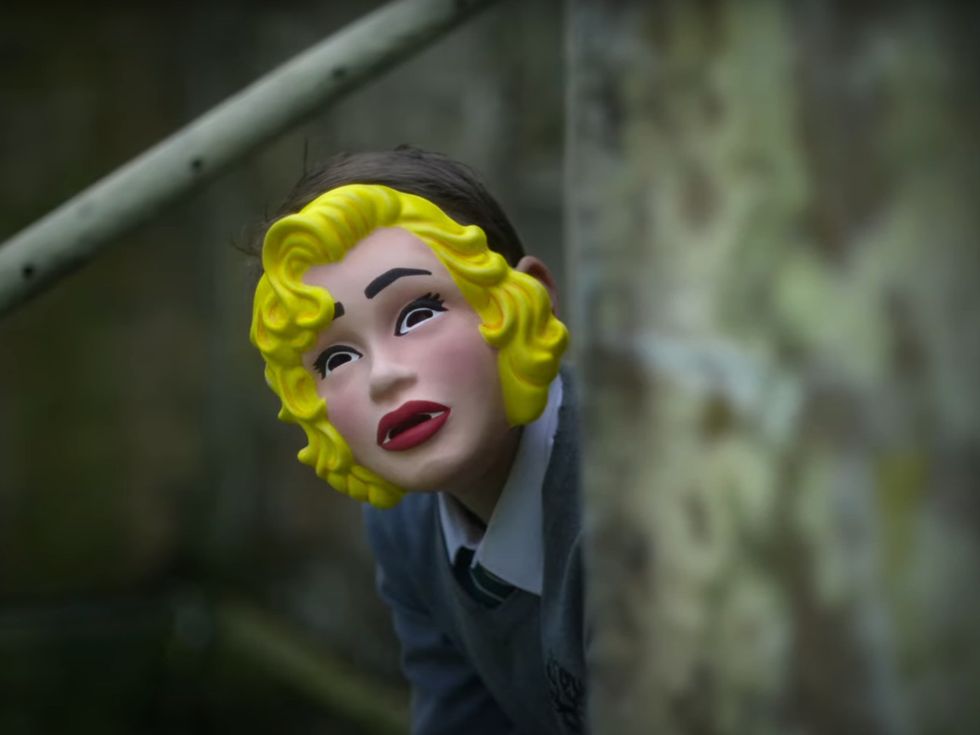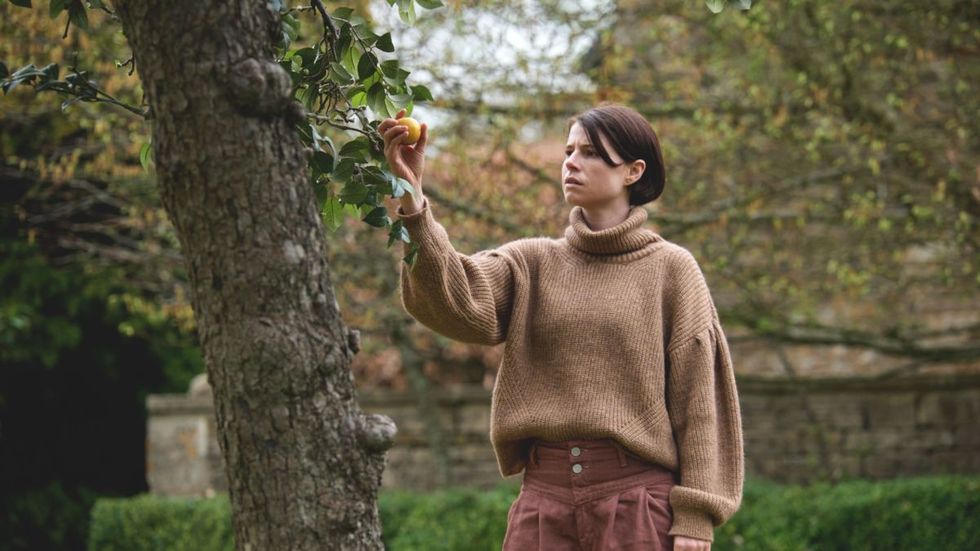This article contains spoilers for ‘Men’
Some time last year, the phrase "red flag" became shorthand for the danger signs in a relationship or a date or a job that suggest it's time to get the hell out. In Men, the new surrealist horror film from Alex Garland, red flags are everywhere, from the creaking old house in the English countryside, to the tree weighed down with forbidden fruit and the fat naked man lurking in the garden. Our protagonist, Harper (Jessie Buckley), chooses this as the unlikely place to see out a period of intense grief on her own, staying put even as a series of sinister men draw in.
From director Alex Garland, who earned acclaim for his novel The Beach, screenplays for films like 28 Days Later, and later his hypnotic sci-fi film Ex Machina, Men marks his clearest move into horror, using the animal madness of grief to the same effect as Ari Aster in Hereditary and Midsommar. As the walls close in there are all your classic horror motifs, from rotting animal heads to disturbing faces carved into stone, but make no mistake, the real monsters here are meant to be the men. Through flashbacks we gradually understand the trauma Harper is suffering from, and this manifests in the horrors that stalk her in the woods and country lanes.
As the film becomes ever more surreal, so too do the caricatures that Men makes of men: the gruff landlord, the lecherous vicar, the smarmy police officer, each of whom are thrust upon her under the guise of help. These men are all played admirably by Rory Kinnear, but the issue that Men encounters is seeming unable to outrun the male gaze of its creator.
The same blurry sketches of villains appear again and again: the creepy clergyman with his limp grey hair, whose hand gives her thigh a lingering squeeze, or the angry boy wearing a doll's mask in a church graveyard who calls her a bitch. In one scene Harper is instructed by the landlord to only flush loo roll down the toilet rather than any unmentionables, or so suggests the disgusted look on his ruddy face, unable as he is to say the word itself. This is a man who has been droning on about Shakespeare and the M4 for the last fifteen minutes, and seems no more likely to know whether women set fire to tampons or flush them down the toilet after using them.
If only it were this easy to tell the good men from the bad, because though Men is clearly leaning in (for want of a better phrase) to the daily drudgery and dangers of misogyny, and the ways it is weaponised against women, the truth is that the real horror is in the moment when you can't tell if you're sat with a villain. This nice guy bait-and-switch was one of the more interesting ideas explored in Emerald Fennell's Promising Young Woman, a film which also featured a line-up of red flags. It doesn't require a female director to understand these nuances, but what seems disappointing in Men is its lack of interest in showing us who Harper is. We witness one scene which vaguely nods at the fact she has a job, though it is unclear doing what, and a smattering of FaceTime calls with a friend suggest she is not a total loner. Part of this is to protect the mystery of her relationship, which is gradually uncovered, but at times it feels as though the beguiling fembot from Ex Machina was programmed with more humanity than this living breathing woman.
Conversely, where Men is excellent is in its portrayal of the relationship between Harper and her husband (Paapa Essiedu, remarkable as ever), where the claustrophobia of their home life and his coercive control is reminiscent of Paddy Considine's twisted domestic abuse film Tyrannosaur. "What is it that you want from me?" she asks him desperately, to which he gives the most horrifying answer of all: "Your love." Another exchange with a police officer, in which he describes the man who broke into Harper's house, bloody and naked, as harmless, is a searing indictment of the ways in which the law fails victims of stalking and sexual assault.
Films should not fail or succeed solely on their ability to represent the experience of being female, but those which set out to portray the horrors of misogyny certainly should be judged on getting it right. In Men, there is the unfortunate sense that it is so pleased with itself for its observations about bad men that watching it starts to feel a little like spending time with the very boors it is trying to skewer. Like hearing someone tell you how you feel rather than listening to what you're actually trying to say – the very kind of red flag that makes you want to get the hell out.
‘Men’ is in cinemas 1 June
















